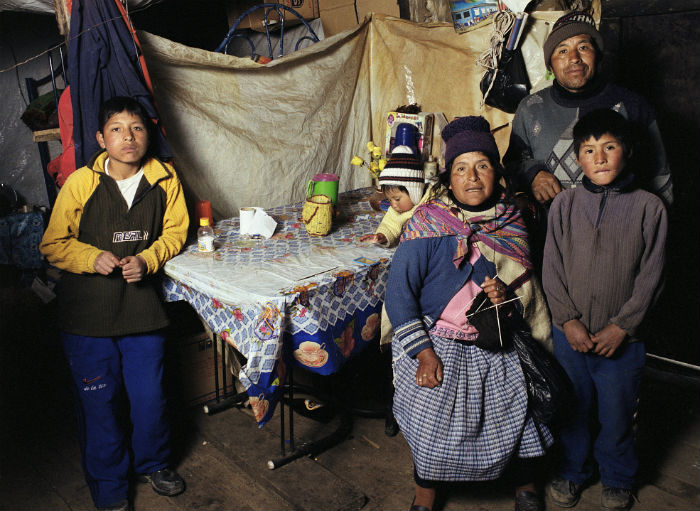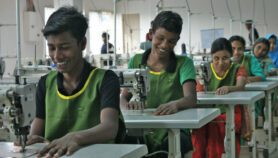By: Anita Makri
Send to a friend
The details you provide on this page will not be used to send unsolicited email, and will not be sold to a 3rd party. See privacy policy.
One afternoon a couple of years ago, I found myself sat in the site office of one of Delhi’s incineration plants and having tea with the manager. The plant was under construction near a landfill, and I was there with my colleague Ranjit Devraj to take some photographs for our story on the Indian city’s waste management system.
The light was gone by the time we left the building so the pictures had to wait for another day. But the meeting sprang to mind vividly last week as I listened to discussions about the informal private sector at an international conference on the subject held in London, United Kingdom, by the International Institute for Environment and Development (IIED).
The Delhi manager, an ex-military man, was courteous and well-versed in environmental sustainability. He explained how the company had learned from the city’s incineration failures and was making sure the plant’s technology was appropriate for the job. The three of us exchanged jovial conversation around an enormous desk.
But there was another person in the room who got little say in the conversation. It was one of the leaders of the association of ‘rag pickers’ who lives and works nearby. He joined us to visit the plant that day — because the story of Delhi’s waste management system cannot be told without the waste pickers.
When the three of us were whisked into the manager’s office for a chat, he took a seat well behind us, away from the main desk. No one blinked.
His place in that room, it occurred to me last week, is something of a metaphor for the place of informal workers — those unregulated or protected by the state — in development planning and discourse. But this isn’t just about marginalisation. There is plenty to suggest that informal work matters for development more widely.
Global economic impact
The first striking message that came through last week’s meeting was how much the world depends on informal work. We heard that in countries such as the Democratic Republic of Congo, ‘invisible production’ due to illegal logging means that formal data can miss as much as 90 per cent of the forest economy; that in Latin America, every other job created was informal even in years of growth; and that a monitoring study of street vendors in ten cities around the world found informal work made up about 80 per cent of household income. [1]
So few would have been surprised that keynote speaker Marty Chen, cofounder of WIEGO (Women in Informal Employment: Globalizing and Organizing) in the United States, called informal workers the broad base of the economy. Chen used waste pickers as an example to make the case for their contribution to ‘green growth’. While there isn’t enough data to know whether other groups of informal workers contribute to such environmentally sustainable economic development, we know that the carbon footprint of waste pickers is smaller than that of formal waste collection services.
When Peter Poschen of the UN’s International Labour Organization took the floor, he said agriculture is an even more compelling example of informal work: one billion people depend on farming for income and 1-in-3 work in the sector.
“ The first thing that struck me was a distinction made by participants between what is and what should be: that the aim should not be to decide what ‘we’ want the sector to be, but to help improve people’s lives wherever they are along the continuum from formality to informality. ”
Anita Makri
We also heard about agriculture’s central role in the Peruvian Amazon: 80 per cent of deforestation there happens in plots smaller than a hectare, according to Alejandro Guarín of the German Development Institute. And in these “tiny pockets of deforestation”, smallholders provide value through ecosystem services and by feeding nearby communities. Controversially he suggested that although their incomes may be relatively low, they may in fact be key players in green growth.
Legal invisibility
But there was also plenty to be said about the invisibility of these key players in global conversations around development and economic growth. Emily Benson of the Green Economy Coalition noted that, although informality features prominently in major reports and some national development plans, most are basic references and fail to discuss how to work with the sector.
However, a bigger problem is invisibility in policies and laws, and the fraught day-to-day reality of people in different types of informal work. Waste pickers get harassed, street vendors get evicted, farmers trade in markets without toilets or clean water. There is little chance of social protections such as health insurance or pensions.
Unsurprisingly, women fare worse. WIEGO’s Sally Roever presented a gender breakdown of the informal economy pyramid, where pay rises and risk decreases as you move up. Men tend to be at the top (more often as employers) and women at the bottom (more often as family workers).
And while big business might hire workers informally, it also attacks ‘unfair competition’ from such workers.
A place at the table
So is the solution to formalise these activities by integrating them into the formal sector or to let them be? There was a melange of views about what to do and ideas about how to do it. And the first thing that struck me was a distinction made by participants between what is and what should be: that the aim should not be to decide what ‘we’ want the sector to be, but to help improve people’s lives wherever they are along the continuum from formality to informality.
Many argued for governments to regulate and manage informal work in a way that’s not chaotic or punitive. Informal workers want a balance of regulation and support such as pensions and other social protections, WIEGO’s Chen said. Their ability to use their work to climb out of poverty depends on this — that’s why integration into economic planning matters.
What could integration look like? Waste pickers in Bogota, Colombia, went through a 25-year process that involved legal battles against the privatisation taking hold in the sector before finally gaining recognition in 2013 — a story that chimes with the experiences of waste pickers in Delhi. It depends on officials seeing the big picture about how informal work is interwoven into formal sectors.
Another success story kept coming back into the conversation: Brazil formalised 5.5 million entrepreneurial businesses in the past five years through a support package that includes access to business development and social protections. The idea here is to create an enabling environment that suits each sector — such packages will look very different for farmers than they will for street vendors.
In his concluding remarks, IIED’s Steve Bass named the big opportunity for inclusion on the global stage: the Sustainable Development Goals. And Chen put it simply: the world has a choice between staying as an island of prosperity surrounded by despair, or integrating the informal sector into development planning.
Thinking about the rag pickers I met and my experience in that Delhi office, the reality of that choice is clear.
Anita Makri is opinion and special features editor at SciDev.Net. @anita_makri
References
[1] Sally Roever Informal economy monitoring study sector report: street vendors (WIEGO, April 2014)














